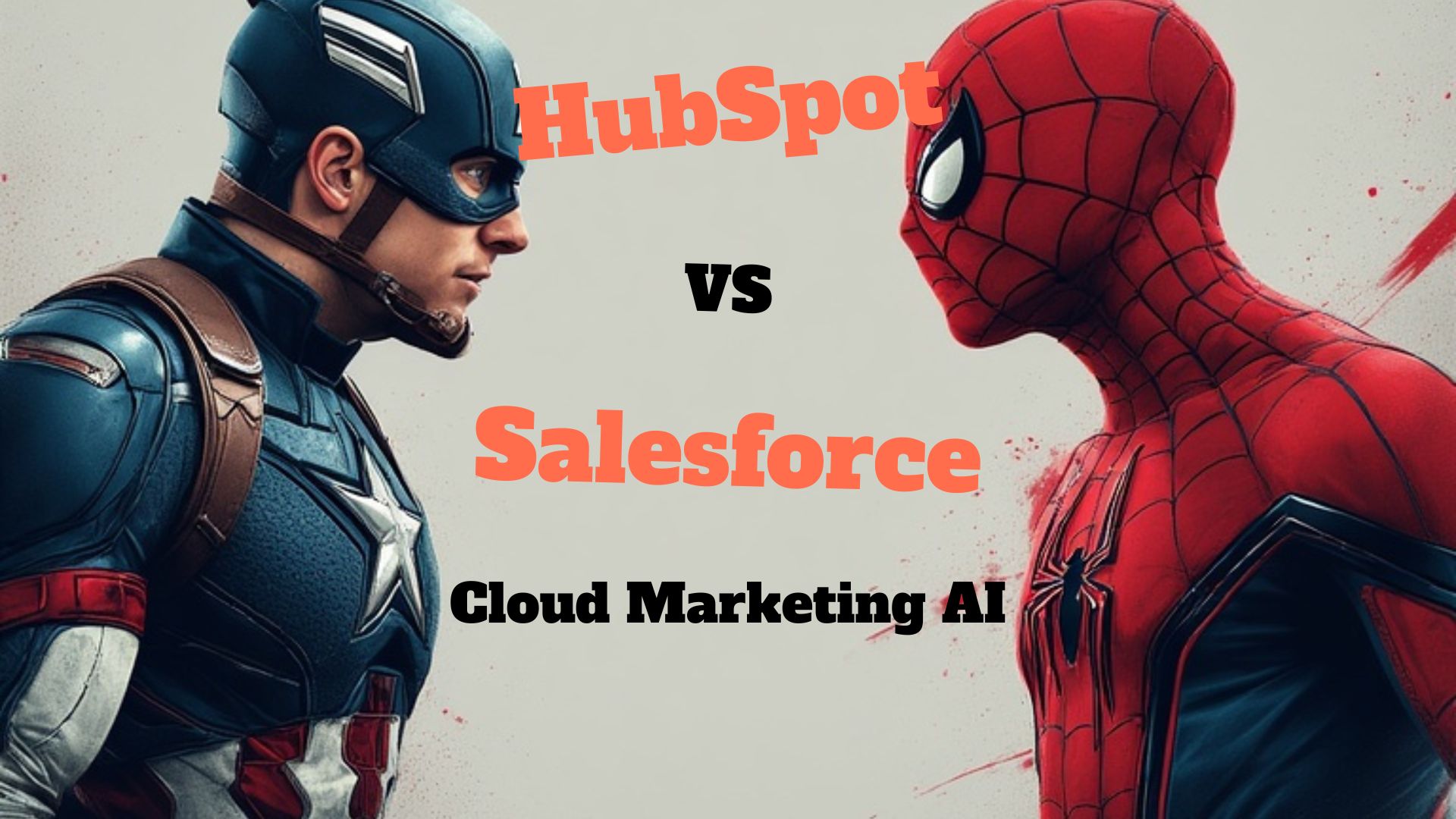HubSpot offers intuitive AI marketing through Breeze Suite starting at $20/seat monthly, while Salesforce provides enterprise-grade Einstein AI starting at $1,250 monthly with more contacts per tier. Your choice depends on organization size, technical resources, and specific AI marketing needs.
See our other Hubspot article here: https://amzoraltd.com/hubspot-marketing-hub-ai-automation-pricing-plans-with-features-cost-breakdown-2025/
Key Takeaways:
- HubSpot’s Breeze Suite offers comprehensive AI marketing capabilities including task assistance, workflow automation, and CRM insights with a more intuitive interface for SMBs and mid-market companies.
- Salesforce Marketing Cloud provides enterprise-grade AI features through Einstein, excelling in predictive analytics, advanced segmentation, and real-time personalization across channels.
- HubSpot’s pricing starts lower ($20/seat monthly) but scales up significantly with more contacts, while Salesforce begins higher ($1,250 monthly) but includes more contacts per tier.
- Advanced AI features in both platforms require higher-tier subscriptions, with Salesforce’s enterprise add-ons potentially adding $100,000+ annually for sophisticated capabilities.
- The right platform choice ultimately depends on your organization’s size, technical resources, and specific AI marketing requirements.
Which Platform Delivers Better AI Marketing
Power in 2025?
The marketing automation landscape continues to grow, with artificial intelligence becoming the decisive factor for many businesses choosing between platforms. According to marketing technology experts at Content Marketing Agent, both HubSpot and Salesforce Marketing Cloud have made significant AI investments, but they target different market segments with their capabilities.
For small to mid-sized businesses seeking intuitive AI marketing tools with a manageable learning curve, HubSpot often provides the better value. Its all-in-one approach integrates AI across marketing, sales, and service functions. Meanwhile, Salesforce Marketing Cloud delivers enterprise-grade AI power through Einstein, particularly excelling for larger organizations with complex multi-channel marketing needs and dedicated technical resources.
HubSpot’s AI
Marketing Capabilities
1. Breeze Suite: Task Assistance, Workflow Automation & CRM Insights
HubSpot’s Breeze Suite represents the core of its AI capabilities, offering three integrated tools that transform how marketers operate. Breeze Copilot functions as an intelligent task assistant, helping marketers draft content, analyze data, and solve problems through natural language interactions. This significantly reduces the time spent on routine tasks, allowing marketing teams to focus on strategy.
Breeze Agents take automation to the next level by managing complex workflow sequences autonomously. These AI agents can handle lead nurturing, customer onboarding, and even personalized follow-ups based on user behavior without constant human oversight. The system continuously learns from interactions to improve its effectiveness.
Completing the suite, Breeze Intelligence delivers real-time insights from CRM data, helping marketers identify trends, opportunities, and potential issues before they become apparent. This predictive capability enables proactive marketing adjustments rather than reactive responses.
2. Content Generation for Blogs, Social, Email & Landing Pages
One of HubSpot’s standout AI features is its comprehensive content generation capability. The platform’s AI can quickly produce draft blog posts, social media updates, marketing emails, and landing page copy that aligns with your brand voice and marketing objectives. This tool analyzes your existing content, audience engagement patterns, and industry trends to generate relevant material.
What sets HubSpot’s content generation apart is its ability to not just create content but to optimize it for specific channels and goals. For blog posts, the AI considers SEO factors; for social media, it adapts tone and length based on the platform; for emails, it focuses on conversion elements; and for landing pages, it emphasizes call-to-action effectiveness.
Marketers can remix and refine this AI-generated content rather than starting from scratch, significantly accelerating content production workflows while maintaining quality and brand consistency.
3. CRM Intelligence with Predictive Scoring & Sentiment Analysis
HubSpot’s AI-driven CRM intelligence transforms raw customer data into actionable insights. The predictive lead scoring feature analyzes dozens of data points to automatically identify which prospects are most likely to convert, allowing marketing teams to prioritize their efforts more effectively.
Sentiment analysis capabilities monitor customer communications across channels to detect emotional tone and satisfaction levels. This enables teams to proactively address negative experiences before they escalate and capitalize on positive sentiment with timely engagement.
These features create a more intelligent marketing operation that can anticipate customer needs rather than merely reacting to them, creating opportunities for precise targeting and personalization at scale.
4. Brand Voice Customization & Dynamic Personalization
HubSpot’s AI allows marketers to define and maintain a consistent brand voice across all content while enabling highly dynamic personalization. The system can be trained on your existing marketing materials to understand your unique style, tone, and messaging preferences.
The platform’s dynamic personalization goes beyond simple mail merge fields by analyzing behavioral data, purchase history, and engagement patterns to deliver truly individualized content. This might include personalized product recommendations, customized content paths, or adaptive messaging based on the customer’s stage in the buyer journey.
This combination of consistent brand voice with deep personalization helps create marketing that feels both cohesive and individually relevant to each recipient.
Salesforce Einstein AI Marketing Features
1. Predictive Analytics & Advanced Segmentation
Salesforce Marketing Cloud’s Einstein AI excels in predictive analytics, offering enterprise-grade forecasting and segmentation capabilities. The system continuously analyzes vast amounts of customer data to identify patterns and trends that would be impossible to detect manually.
Einstein’s advanced segmentation tools automatically identify micro-segments within your audience based on behavioral patterns, preferences, and predicted future actions. Rather than marketers having to define segments manually, Einstein can discover naturally occurring customer groupings that share similar characteristics or behaviors.
These capabilities allow marketing teams to anticipate customer needs, predict churn risks, and identify high-value opportunities before they become obvious, enabling truly proactive marketing strategies.
2. Generative Campaign Creation & Journey Optimization
Salesforce Einstein can draft entire marketing campaign briefs, suggest optimal audience segments, and generate key campaign components automatically. This capability extends beyond simple content creation to include strategic recommendations based on historical performance data.
The AI’s journey optimization features continuously analyze customer pathways through your marketing touchpoints, identifying bottlenecks, drop-off points, and opportunities for improvement. Einstein then suggests or even automatically implements adjustments to optimize the customer journey for better conversion rates and engagement.
This intelligent approach to campaign management helps marketing teams iterate more quickly and efficiently, constantly improving results without manual testing and analysis of every variable.
3. Real-Time Personalization Across All Channels
Salesforce Einstein AI delivers sophisticated real-time personalization capabilities that adapt to customer behavior as it happens. Unlike systems that rely on static segmentation rules, Einstein analyzes customer interactions in the moment to deliver highly contextual experiences across email, web, mobile, social, and advertising channels.
This cross-channel personalization ensures that customers receive consistent, relevant messaging regardless of how they engage with your brand. For example, if a customer browses a specific product category on your website, Einstein can immediately adjust email content, mobile app recommendations, and even digital advertising to reflect this interest.
The system’s real-time decisioning engine continuously evaluates thousands of data points to determine the optimal content, timing, and channel for each customer interaction, creating truly individualized marketing experiences at scale.
4. Enterprise Add-Ons: Data Cloud & Loyalty Management AI
Salesforce extends Einstein’s capabilities through specialized enterprise add-ons that address specific advanced marketing needs. Data Cloud AI integrates and analyzes data from disparate sources to create a unified customer profile and enable cross-cloud intelligence, enhancing personalization across the entire customer journey.
Loyalty Management AI helps businesses optimize customer retention programs by predicting which rewards and incentives will drive the most value for different customer segments. It can automatically adjust loyalty program parameters based on customer behavior and business objectives.
These enterprise-grade AI extensions demonstrate Salesforce’s focus on serving large organizations with complex marketing needs across multiple business units and customer touchpoints.
Complete Pricing Breakdown: What You’ll Actually Pay
Understanding the true cost of marketing automation platforms requires looking beyond the advertised starting prices to consider the total investment required for your specific needs.
HubSpot Marketing Hub Pricing Structure
1. Starter: $20/seat Monthly (1,000 Contacts)
HubSpot’s entry-level Marketing Hub Starter plan costs $20 per seat per month when billed annually. This includes 1,000 marketing contacts, with additional contacts available for purchase. The Starter plan includes email marketing, forms, landing pages, and basic reporting.
While this tier provides access to some AI-powered content suggestions and basic automation, most of HubSpot’s advanced AI capabilities require higher tiers.
2. Professional: $890 Monthly (2,000 Contacts, 3 Seats)
The Professional tier jumps significantly to $890 per month (billed annually) and includes 2,000 marketing contacts with 3 user seats. This tier unlocks most of HubSpot’s AI marketing capabilities, including marketing automation, smart content, and predictive lead scoring.
Many businesses will need to purchase additional contacts beyond the included 2,000, which adds to the monthly cost. HubSpot charges on a sliding scale for additional contacts, with the per-contact price decreasing as volume increases.
3. Enterprise: $3,600 Monthly (10,000 Contacts, 5 Seats)
At $3,600 per month (billed annually), the Enterprise tier provides 10,000 marketing contacts and 5 user seats. This level includes HubSpot’s most advanced AI features, such as adaptive testing, advanced reporting, and predictive lead scoring.
The Enterprise plan also offers custom reporting, revenue attribution reporting, and more advanced team management features. As with other tiers, additional contacts and user seats increase the monthly cost.
Salesforce Marketing Cloud Cost Analysis
1. Professional: $1,250 Monthly (15,000 Contacts)
Salesforce Marketing Cloud’s Professional edition starts at $1,250 per month and includes up to 15,000 contacts. This tier provides basic email marketing, customer journey mapping, and limited access to Einstein AI features.
While the starting price is higher than HubSpot’s entry point, the Professional tier includes more contacts and focuses on core email marketing and journey building capabilities.
2. Corporate: $4,200 Monthly (45,000 Contacts)
The Corporate edition costs approximately $4,200 per month and supports up to 45,000 contacts. This tier unlocks more advanced segmentation, journey building, and personalization features, along with expanded Einstein AI capabilities.
The significant jump in price reflects not just the increased contact limit but also access to more sophisticated marketing automation tools and predictive analytics.
3. Enterprise: Custom Quotes (Up to 500,000 Contacts)
Salesforce Marketing Cloud Enterprise is priced through custom quotes and typically supports up to 500,000 contacts. This tier delivers full access to Einstein AI features, advanced journey optimization, real-time personalization, and cross-channel campaign management.
Enterprise pricing varies significantly based on specific business needs, contact volume, and desired features, but typically starts in the five-figure monthly range.
4. Add-On Costs: $100,000+ Annually for Advanced Features
Many of Salesforce’s most powerful AI and marketing features are available as add-ons that can substantially increase the total cost. Advanced add-ons like Data Cloud, Loyalty Management AI, and specialized industry solutions can add $100,000 or more annually to the base subscription cost.
These add-ons are typically priced separately and require annual commitments, making them more suitable for enterprise organizations with substantial marketing budgets.
HubSpot’s Key Competitive Advantages
1. All-in-One Marketing Suite with Social Media Management
HubSpot’s integrated approach combines marketing, sales, service, and CMS capabilities in a single platform, eliminating the need for multiple disconnected tools. Unlike Salesforce, which often requires integrating separate products, HubSpot provides native social media management, content creation, and campaign execution in one system.
This unified approach creates more consistent customer experiences and simplifies reporting across the entire marketing and sales funnel. It’s particularly valuable for teams that want to reduce complexity and tool sprawl.
2. Extensive Marketplace with 350+ Third-Party Integrations
HubSpot’s App Marketplace features over 350 certified integrations with popular business tools across categories like analytics, e-commerce, social media, and video. This extensive ecosystem allows businesses to easily connect HubSpot with their existing tech stack.
The platform’s open API architecture and robust developer tools also make it straightforward to build custom integrations when needed. This flexibility helps businesses create a tailored marketing technology environment without sacrificing the benefits of an integrated platform.
3. Modern Interface with Superior Email & Landing Page Builders
HubSpot’s user interface is consistently rated more intuitive and modern than Salesforce’s more complex environment. The platform’s drag-and-drop email and landing page builders make it easy for marketers with limited technical skills to create professional-looking assets quickly.
The visual automation builder similarly simplifies the process of creating complex marketing workflows, with a user-friendly canvas that makes it easy to visualize and edit customer journeys. This approachability reduces the learning curve and helps teams become productive more quickly.
Where Salesforce Marketing Cloud Excels
1. Enterprise-Grade Customer Support with Phone & Live Chat
Salesforce offers comprehensive support options, including 24/7 phone support for higher-tier customers and live chat for immediate assistance. This enterprise-grade support infrastructure is designed to minimize downtime and quickly resolve technical issues.
For large organizations where marketing technology is mission-critical, Salesforce’s robust support ecosystem provides valuable peace of mind and faster issue resolution compared to HubSpot’s more limited support options at lower tiers.
2. Sophisticated CRM Integration for Complex Sales Processes
While both platforms offer CRM capabilities, Salesforce’s core strength in customer relationship management provides deeper integration for companies with complex sales processes. The seamless connection between Marketing Cloud and Sales Cloud creates a unified view of the customer across marketing and sales interactions.
This tight integration is particularly valuable for B2B companies with lengthy sales cycles, multiple stakeholders, and sophisticated opportunity tracking needs. It enables more precise attribution of marketing influence on revenue and better alignment between marketing and sales teams.
3. Advanced Customization for Analytics & Personalization
Salesforce offers exceptional customization capabilities for organizations with unique requirements and dedicated technical resources. The platform’s API and development tools allow for extensive customization of analytics dashboards, personalization engines, and automated workflows.
Enterprise organizations often appreciate the ability to tailor Salesforce precisely to their specific business processes and reporting needs, even if this customization requires more technical expertise and investment than HubSpot’s more standardized approach.
4. Powerful Segmentation for Multi-Channel Customer Journeys
Salesforce Marketing Cloud excels in creating sophisticated, multi-step customer journeys across channels. Its Journey Builder tool provides advanced conditional logic, complex branching paths, and real-time adaptability based on customer behavior.
For organizations managing intricate customer lifecycles across multiple touchpoints, Salesforce’s powerful segmentation and journey orchestration capabilities provide the flexibility to create highly personalized experiences at scale, particularly for businesses with large customer bases and diverse product offerings.
Which Platform Is Right for Your Specific Business Needs?
Choosing between HubSpot and Salesforce Marketing Cloud ultimately depends on your organization’s specific requirements, technical resources, and budget constraints.
HubSpot is typically the better choice for:
- Small to mid-sized businesses seeking an intuitive, all-in-one marketing platform
- Teams with limited technical resources who value ease of use
- Organizations that need integrated marketing, sales, and service capabilities
- Companies looking for a lower initial investment with room to scale
Salesforce Marketing Cloud is generally more suitable for:
- Enterprise organizations with complex, multi-channel marketing needs
- Businesses already using Salesforce CRM who want deep integration
- Companies with dedicated technical resources for implementation and maintenance
- Organizations requiring highly sophisticated personalization and journey orchestration
Both platforms continue to invest heavily in AI capabilities, with HubSpot focusing on making AI accessible to marketers of all skill levels, while Salesforce builds increasingly powerful enterprise-grade AI solutions for complex marketing operations.
When evaluating these platforms, consider not just your current needs but your anticipated requirements over the next 2-3 years, as migrating between platforms can be resource-intensive. Also factor in the total cost of ownership, including implementation, training, and ongoing administration.
Content Marketing Agent specializes in helping businesses navigate the complexities of marketing technology selection to find the perfect fit for their unique requirements.



Pingback: Marketo vs Pardot for AI Automation Marketing Tools Comparison
Pingback: Salesforce Marketing Cloud AI Pricing Tiers with Feature Comparison - 2025